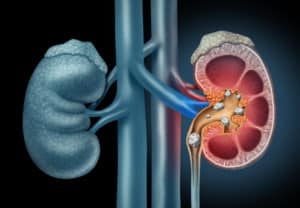What are Kidney Stones?

The formation of kidney stones can be a serious problem if not handled properly. According to statistics, an estimated 19 percent of men and 9 percent of women will likely develop kidney stones in their lifetime. Once a person has experienced one bout of kidney stones, they are more likely to face the same problem again in the future. Here, we discuss what causes this condition, how kidney stones may present physically, and what may be done if kidney stones are found.
What are Kidney Stones, and What Causes Them?
Fluid in the blood is integral to the sufficient filtration of wastes through the kidneys. When the blood does not have enough fluid, wastes that get filtered in the kidneys may stick together. This causes crystals known as kidney stones to form. A kidney stone may remain in the kidney or it may travel to the urethra, the tube that connects the kidney to the bladder. In severe cases, a kidney stone may create a blockage that prevents urine flow.
Types of Kidney Stones
- Kidney stones may be formed from various substances, including:
- Most kidney stones are a combination of calcium and oxalate or calcium and phosphate.
- Uric acid. This type of stone occurs when there is too much uric acid in the urine, causing particles to clump together into crystals.
- Struvite kidney stones contain ammonium, magnesium, and phosphate. They may occur in people who experience frequent or persistent urinary tract infections.
- Cystine is a chemical that is naturally found in the kidneys. Cystine kidney stones may form as a rare genetic disorder that involves the leakage of this chemical from the kidneys into the urine.
Symptoms of Kidney Stones
Not all kidney stones prompt symptoms. Smaller stones may pass without causing discomfort. Larger stones may present symptoms such as:
- Intense pain in the back or lower abdomen
- Nausea and vomiting
- Blood in the urine
- Difficulty urinating if a kidney stone is blocking urine flow
- Some people develop a fever
Do Kidney Stones Have to be Treated?
Some kidney stones can pass through the urinary tract without any indication that they are even there. If symptoms occur, a urologic exam should be scheduled. A urologist can review symptoms and order specific tests to determine if kidney stones are the cause. Stones can be measured to estimate their likelihood of passing naturally. If this is not likely, the standard approach is to use ultrasound or other modalities to dissolve stones into small fragments that can then be passed through the urine.
The team at UT Urology in Chattanooga is here to help you. If you are showing signs of kidney stones, schedule your visit with us at (423) 778-5910.

